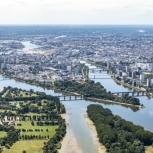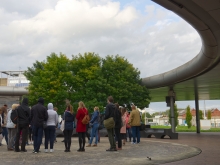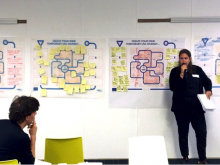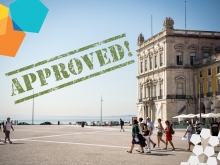
Nantes
The territory offers a considerable range of training courses in many fields. A real asset for students and a pool of skills recognised for local businesses. As a land of innovation, the Nantes metropolis also has a high research potential. Nantes was awarded European Green Capital by the European Commission for its efforts to reduce air pollution and CO2 emissions, for its high-quality and well‐managed public transport system, and for its biodiversity.
Culture also plays an essantial rôle for making the city attractive from outside and pleasant to live in for the inhabitants.
In November 2014, Nantes was one of 14 French cities awarded with the ‘French Tech’ label, a label assigned to French metropolises recognised for their start‐up ecosystem. ‘French Tech’ aims to provide a strong common visual identity to French start‐ups as well as to promote entrepreneurial exchange between them.
In 2019 Nantes was designed as a «European Capital for Innovation».
A big ambition for Education:
The municipality has no juridiction over educational activities within schools nor is involved in teaching or curriculum, however they can propose activities during school time to complete the education offer for children and are also in charge of “extra- school time activities” inside schools. After 2013 the extra-school time was enlarged with this reform, and municipalities have the responsibility to organize this time with activities adapted to schools but with a general organisation at the same time. Also, when there is no juridiction or presence in curriculum for a subject/matter, then cities can propose activities in that given field.
The actions we developed with ON BOARD project will be a kind of “compost” to enrich the collaboration between stakeholders in the updating process of our local Plan (PEDT) particularly about the following topics:
→ reduction of inequalities
→ health and well-being of children
→ skills for XXI’s century
SOME RELATED NETWORKS
Stay Tuned
PREVENT
Article
Cities engaging in the right to housing
Article
Finding the silver lining in empty heritage: tales of temporary use
Article
Improving children’s education for a sustainable urban future
Article
REFILL@LILLE: Policy Design Labs and URBACT exchange networks
News







